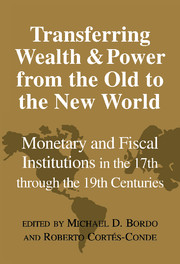 Transferring Wealth and Power from the Old to the New World
Transferring Wealth and Power from the Old to the New World Book contents
- Frontmatter
- Contents
- Contributors
- 1 Introduction
- PART I THE OLD WORLD
- PART II THE NEW WORLD
- 7 The United States: Financial Innovation and Adaptation
- 8 The Legacy of French and English Fiscal and Monetary Institutions for Canada
- 9 Mexico: From Colonial Fiscal Regime to Liberal Financial Order, 1750–1912
- 10 Property Rights and the Fiscal and Financial Systems in Brazil: Colonial Heritage and the Imperial Period
- 11 Argentina: From Colony to Nation: Fiscal and Monetary Experience of the Eighteenth and Nineteenth Centuries
- 12 Continuities and Discontinuities in the Fiscal and Monetary Institutions of New Granada, 1783–1850
- PART III COMMENTARIES
- Index
10 - Property Rights and the Fiscal and Financial Systems in Brazil: Colonial Heritage and the Imperial Period
Published online by Cambridge University Press: 27 March 2010
- Frontmatter
- Contents
- Contributors
- 1 Introduction
- PART I THE OLD WORLD
- PART II THE NEW WORLD
- 7 The United States: Financial Innovation and Adaptation
- 8 The Legacy of French and English Fiscal and Monetary Institutions for Canada
- 9 Mexico: From Colonial Fiscal Regime to Liberal Financial Order, 1750–1912
- 10 Property Rights and the Fiscal and Financial Systems in Brazil: Colonial Heritage and the Imperial Period
- 11 Argentina: From Colony to Nation: Fiscal and Monetary Experience of the Eighteenth and Nineteenth Centuries
- 12 Continuities and Discontinuities in the Fiscal and Monetary Institutions of New Granada, 1783–1850
- PART III COMMENTARIES
- Index
Summary
PROPERTY RIGHTS IN A LONG-TERM PERSPECTIVE
Rent-extraction activities traditionally have played an important role in Brazil since colonial times; witness the central role played by farmed-out monopolies and tax contracts and the many restrictions affecting economic activities. Much has been written about property rights in imperial Brazil (1822–89), but most of it has dealt with either land property rights or slave-owning during the transition to a free-labor regime. Labor policies played a major role in Brazil from colonial times as the government underlined permanently the dominance of the objective of maintaining low manpower costs throughout the period. Requiring net slave imports, the Brazilian economy was particularly vulnerable to an interruption of the slave trade. Thus, the commitment to cease slave imports in 1830 was openly disregarded for 20 years, and enforcement came only as a direct result of British pressure through the Royal Navy, especially in the second half of the 1840s.
As the final abolition of slavery only took place – without compensation to owners – in 1888, the transition to free labor remained one of the important economic issues during the empire. As free labor was attracted to Brazil, land legislation became a crucial element of wage determination for free labor. In spite of land legislation in the first half of the 1850s that would have allowed land ownership by immigrants, actual control of the land (posse) and the ability to preserve this control were the crucial factors.
- Type
- Chapter
- Information
- Transferring Wealth and Power from the Old to the New WorldMonetary and Fiscal Institutions in the 17th through the 19th Centuries, pp. 327 - 377Publisher: Cambridge University PressPrint publication year: 2001
- 4
- Cited by


